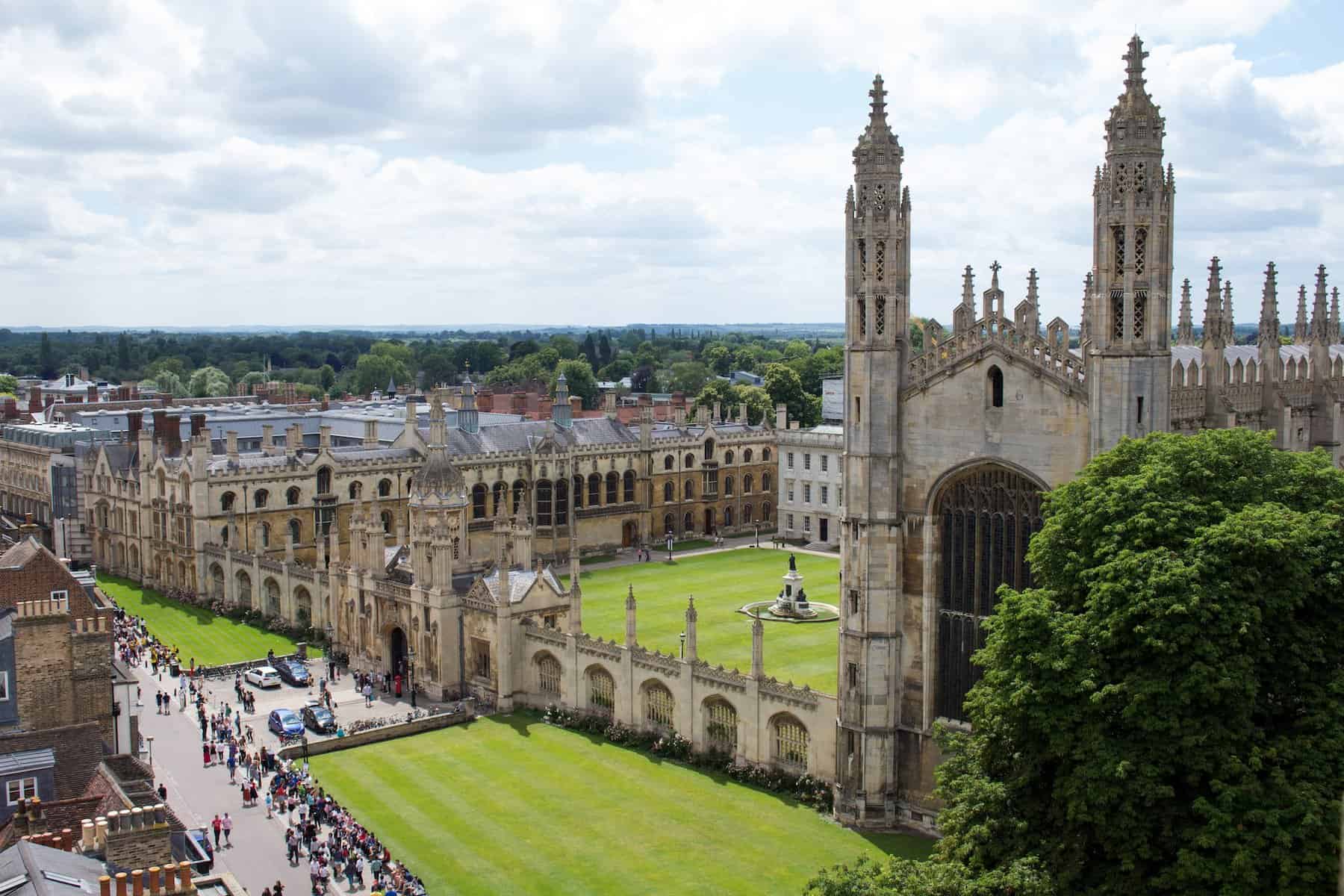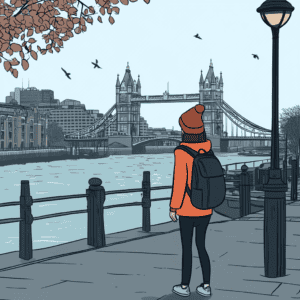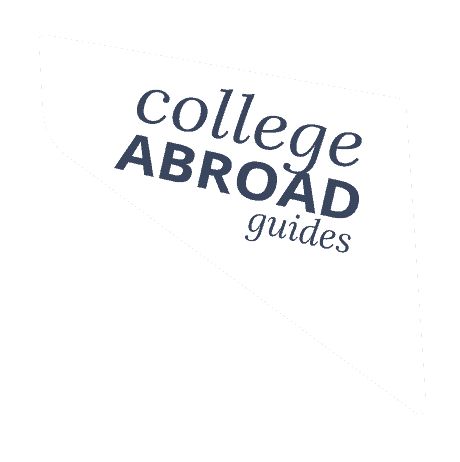Discover the Legacy of Hawking: What is Cambridge University Like?

- Originally published
- Last updated on December 4th, 2023 at 09:08 am
Table of Contents
Stuffed full of history, this 800-year-old university comes with its own medieval town and a reputation that entices modern students to the shores of the River Cam to spend three years in one of its colleges. Don’t know the difference between rowing and punting? Never attended evensong versus just “church”? Cambridge is the place where you’ll finally learn these important pieces of British life.
For internationals, it’s important to figure out this ancient college system and all its insider jargon. After all, how else will you separate Cambridge from that other top-flight competitor? Which students would thrive here? You’ll have to figure it out because you can only apply to one: Cambridge or Oxford.
We mined Youtubes, dug into town life, cafeteria highlights (don’t get excited), and housing snafus, and interviewed students to get the details on real life at Cambridge.
So what is Cambridge University like?
Here’s the TLDR: The University of Cambridge is a prestigious university in a medieval, bike-friendly town. It’s comprised of many small colleges that offer familial camaraderie and tradition. Students are known to study hard and say they’ve experienced loneliness on campus. Even so, their spring ball is one of the UK’s most notorious parties, and the town’s low-budget pub is one of the largest in the country. Cambridge’s private school admittance rate is high (25% of Cambridge versus 7% of the country as a whole), but high rates of internationals (40%) help make for a diverse environment.
If you’re still not sold on England as a whole, consider the University of St. Andrews (up in Scotland, also in the UK), or get acquainted with how to go to college in England.
Cambridge University by the Numbers
Degrees: BA, MEng, MDes, MMath, MB, Msci
Majors: 30 undergraduate programs with top-ten global rankings in arts & humanities, biology, biotechnology, cell biology, mathematics, cell biology and genetics, psychiatry, endocrinology, and space science. Unique offerings include land economy and a program in Anglo-Saxon, Norse, and Celtic.
Location: Cambridge, Cambridgeshire, Scotland
Cost for international students: £25,734 for classics, religion, economics, and philosophy courses, £39,162 in engineering, psychiatry, and the natural sciences, and £67,194 in medicine or veterinary medicine.
On-campus housing cost: £117 to £202 weekly (£3,510 to £6,060 per academic year). At the low end, you’ll score a very affordable single room, but share a bathroom and basic kitchen.
FAFSA Funds: Yes
Abroad from abroad: There’s no study abroad office. A Year Abroad Office serves the department of Modern and Medieval Languages and Linguistics, which requires a year abroad. Other departments seem to actively discourage leaving Cambridge during Cambridge terms.
Student body: 24,270 total students (12,940 undergrads) with 5,176 (40%) international.
Five adjectives: Workaholic, scientific, bucolic, quirky, inquisitive
Living in Cambridge
Cambridge is a small city that’s grown almost 20% to nearly 150,000 people in the last ten years. While that’s hardly a village, Cambridge can sometimes feel like one: this specimen of British beauty, with narrow streets and rolling green spaces, only became a city in the 1950s.
A downside of its unparalleled charm is that businesses in Cambridge’s commercial center close up shop early, and it can feel like there’s little to do in the evenings besides hit up the pubs and clubs. Eateries close early and Cambridge students scurry back to their Gothic reading rooms to study.
Cambridge is rural enough that cattle still low in its city’s parks, lending a sort of medieval magic to a modern city. The grazing spaces of Cambridge saw less resistance to the last few centuries’ privatizing land-use laws, in part because the university had little need to battle locals for control of the fields and marshes surrounding their libraries. While wealthy Londoners ran out the farmers in a different sort of tragedy of the Commons, Cantabrigians embrace their countrified atmosphere. Today, you won’t find just cows interrupting your picnics — there are so many ducks waddling through the streets that there’s even a “ducks of Cambridge” Pinterest board showcasing all the species you may encounter.
Naturalists fit in well in homey Cambridge. Heck, you can even grab lunch from from the same shop that once sold a bicycle to Charles Darwin. While the building has become a restaurant and no longer sells bikes, cycling is alive and thriving in Britain’s bike capital.
With the center of the city closed to most motor vehicles, bikes make up enough of the traffic here to make you feel like you’re attending the University of Amsterdam. There’s just one warning for students: Cambridge has one of the highest rate of bike theft in the UK.
After buying a lock for yours, hop on, and ride along the river paths. You can take the River Cam towpath out of town and cruise for miles on an old Roman road route through the countryside (but watch for cycling rowing coaches following their teams from the shore!).
Back in town, be sure to stroll around the town by day to soak up its charms. Stop by a pub like the Anchor, and take your pint out back where you can watch the flat bottom boats drift by. Just a block away, rent your own, or hire an experienced punter. As they goad the boats onward using a long stick, they’ll show you the “Backs,” or back faces of the colleges lined up along the river. They also tell stories about the colleges’ history (there is plenty to learn, as Cambridge itself contains 31 colleges scattered around town).
In Cambridge, the town absolutely floored me. It’s gorgeous, traditional, and cozy. It felt so livable I knew Cambridge was the right choice for me.
Punts also float under Isaac Newton’s famous mathematical bridge, rumored to have been assembled in an arch using straight lumber, all without any nuts or bolts. In the local legend, students were forced to take it apart and found they could not figure out how to reassemble it without using nuts and bolts. Today, the bridge’s design is striking, but its sturdy connections make river-goers wonder if the bridge was ever really constructed any other way.
They also pass the Bridge of Sighs, though not the one in Venice, Italy. This version connects parts of St. John’s College in Gothic revival splendor.
The river is the best way to orient yourself to this town that’s been at the forefront of academic research longer than all but three other universities worldwide. As you’d expect from a historical city steeped in learning, architecture and tradition exude from the town’s timbers, making it an appealing spot for students who want to dive into history.
That’s true, but it also indicates Cambridge’s struggle to offer students a sense of real-world relevance. You can almost certainly stay in Cambridge’s historic city center for most of your time here. It’s called the “Cambridge bubble,” and an aptly named “Reality Checkpoint” lamppost marks the spot where you might venture into the far-flung reaches of town and meet “real” humans, but when returning, leave the mundane world altogether.
The best part of Cambridge is Mill Road. There are great vintage finds and international restaurants.
Cambridge isn’t a complete cow-town. There’s more nightlife than you might think, including a big warehouse. Students head out on Wednesdays to Revolution (AKA Revs, a multi-city club franchise that hosts special nights and attracts a crowd you won’t see there on other evenings).
At clubs like Lola Lo, you can catch a decent rooftop ABBA party. Hit up Vinyl is you’re looking for something closer to a MarioKart circus blacklight course. Bottom line: Cambridge caters to students, and there are pockets of Cambridge students who aren’t hitting the books every night. There’s even a larger arts venue for music, theater, and comedy: the Cambridge Corn Exchange. You can also find amateur student productions and improv at The ADC Theatre, with student-friendly prices to match. What you won’t find in Cambridge is an indie music scene or a ton of variety.
And while Cambridge claims to have the largest LGBTQIA+ scene in the East of England, gay nights have to stand in for and gay or lesbian clubs.
University of Cambridge’s Campus and Accommodation
It’s all about the College System
Cambridge’s campus is woven into the fabric of the city, so students have the benefit of coexisting in the historic city center with locals, popping into tons of cool eateries as they go about their days, and having more choice than students who are locked onto college campuses with nothing but a convenience store and some hummus packs to tide them over til Monday.
The drawback to this system is the decentralized nature of university life at Cambridge. Add 31 different “colleges” to the mix, and students here come away without a cohesive university identity. Instead, expect to procrastinate by indulging in articles that assign every superhero, celebrity, and Taylor Swift album to a specific Cambridge college (then take one to find out if you’re even in the right college). Are you wild? Athletic? What are your favorite pants? It all goes into filtering you into a funnel that leads to slight variations on the overall persona of the Cambridge nerd, with all its many twists.
The college system is an advantage. Right from the beginning, you aren’t just a number in a large university but an individual in a small college where you have your meals, room, and social events. It helps you meet people from outside your course, which I don’t feel happens as easily in other universities.
The bottom line: Cambridge students and the Cambridge campus is divided. Its colleges define its students almost as much as does Cambridge University itself, and the division starts right from the beginning, as students apply to a college with the intent to make it their home for their three years at Cambridge, regardless of their field of study. Colleges often guarantee housing to undergraduates from fresher’s week to graduation, providing not only rooms but student services, gyms, activities, as well as dining halls that are confined to members. Even clubs and societies can housed in specific colleges.
As at Hogwarts, students interested in everything from poetry to potions might end up as Hufflepuffs; it’s not about your aptitude or interests — it’s more about finding a space of belonging within the greater university (though some smaller colleges don’t accept applicants from all fields of study, and others have a bias about the sorts of prerequisites they’d like you to have).
Picking a College?
A large part of picking a college is therefore about its aesthetic. Want a stunning castle that oozes choir music from its picturesque chapel? Think about King’s. Looking for more modern digs? Fitzwilliam will feel less stuffy. It reminds us of a suburban YMCA swimming pool complex circa 1975, but comes with a certain familiarity that can be hard to find in the cloistered halls of more historical places (not to mention its better insulation on blustery winter nights).
Far-flung colleges can also drastically alter a student’s time at Cambridge. For example, the Victorian Girton College lies more than 2 miles north of Cambridge’s city center. While it boasts its own café and bar in its impressive Victorian hall, it’s also a long way from the rest of Cambridge.
Likewise, Homerton students find they’ll have to get a bike if they want to see friends in other colleges. This southernmost, largest college of Cambridge houses students who value the separation of their daily work from their “home” college and can relax near their orchard (with beehives!) and far from Cambridge’s ever-present tourists.
On the flip side, choosing a central and iconic college can mean a 5-minute walk to class in the morning (though be sure to check the location of your department first), central advising, student services, libraries, and computing facilities. It can also be more expensive, with smaller rooms, less separation from the stress of studies, and more tourists.
Advantages of the College System
For non-traditional students, Cambridge and its college system can be a breath of fresh air. There are all-women and mature-student colleges to support diverse students while keeping them all nestled in a supportive academic home.
Some of the central colleges have student accommodation off-site, which I didn’t know when applying! You have to be aware of where you might be staying and whether that’s what you want.
Further, different colleges all have their own independent budgets. Some are richer than others, while some place a higher priority on supporting students through need-based scholarships. There are also different levels of hands-on student support available, too. Both should be a part of your decision about where you’d like to land.
For the cost-conscious, know that even within a college, accommodation costs can differ greatly. How will rooms be chosen? How much control will you have over the type of accommodations (and their costs) you can choose each year?
Costs are also affected by the differing facilities that each college boasts. Three colleges have their own swimming pools! So if you’re going to be shelling out cash for the local gym, these colleges can save you some dough. Want to cook your own meals with fresh food from Aldi’s (a wallet-friendly supermarket)? Some colleges are right next door!
Further, colleges are the home bases for tutors, wellbeing staff, chapels, and some academic supports. At Queen’s College, for example, you’ll find a dedicated mental health team.
Clubs, Societies, and Student Life
There are even societies (student clubs) that are tied to their colleges and are not open to all Cambridge students. While there are plenty of general university clubs to join, be aware that some sports teams and popular societies are tied to individual colleges. It’s possible for students to join from another college, especially if their own college doesn’t have a comparable team, but it’s definitely easier to make a home with your teammates, heading out and back to your college together, or meeting within its walls. You may not have access to college facilities, may be charged additional membership fees, and may miss out on a lot of team camaraderie that comes from everyone else spending so much more time together at events you’re not welcome to join, like formal dinners.
Cambridge has over 400 societies, so you can get involved in so much. The college system gives you a smaller home within this world of opportunity.
The college system means a dizzying array of choices that can sometimes overshadow the choice to apply to Cambridge as a whole. Once accepted by a college, students tend to celebrate their own college, forever deciding theirs outshines all the rest. And with so many colleges, all with differing facilities, meal options, house allocation schemes, academic proclivities, and even vibes, it can just be easier to learn the ropes of your own college.
Moreover, there are some campus highlights you may never see if they’re in another college. For example, Clare College’s student bar is in a church crypt. King’s has its own wine cellar. Where you make your home truly impacts what you think Cambridge University’s “campus” and “accommodation” is like. It may be more apt to talk of Cambridge as 31 loosely connected campuses.
Something simple is that St. Catharine’s College does for student wellbeing is host weekly duck-feeding walks. The ducks are my favorite thing about Cambridge!
Colleges? Or University?
It might seem that Cambridge is brought together only to scowl at the tourists that linger around the King’s College Chapel. But with so much history, the colleges also bring a sort of unifying effect to the larger university and the town spaces squeezed around it. Many of the colleges are charming and historical, with multiple opportunities to show off your Instagram game throughout, commune with the spirits of 14th-century monks, and wear a gown on the regular.
While the frequency of things like formal dinners differs, the culture where college students pay for, dress up for, and then eat formal dinners (along with paired wine courses) is unique. Add the university’s all-in May Ball, and you can’t deny that there’s a style at Cambridge that you won’t get anywhere in the US.
Study at the University of Cambridge
Studying in this Nobel-prize factory (with more alumni awards than any other world institution) can be intimidating. Students here have a lot of jargon to learn before even sitting for their application interview. After that, they have to sort through college choices and programs. Once they get to Cambridge, students say they’ll. “Have to work hard to stay on top of things and write more papers than they ever thought they could!”
Unique Point #1: Supervisions are like Discussion Sessions on Steroids
One prime difference from Cambridge to the average college experience is what’s called “supervisions.” These tutoring sessions with up to two other students ensure Cambridge students get oral feedback from PhD students or professors on their work all along the way. At other universities, these would be seminars or discussion sessions. It can feel intimidating, but you can also bet you’ll emerge from your undergraduate years eons ahead of students from other universities who never hear a sentence of personalized feedback. Besides, speaking out in front of two students can feel less anxiety-inducing than carrying a discussion in front of ten students. It’s all a matter of personal preference.
Unique Point #2: A “Tripos” System Just Means you can Study a Couple of Main Areas, Not Just One
Another Cambridge selling point is its prowess at allowing students to mix topics and explore more generalized interests before specializing. If you’re not 100% sold on your program of study, Cambridge can be a good choice in England. Here’s why: The Tripos system is unique to Cambridge, and once referred to the 3-pronged stool that students would perch upon during examinations. Today, it refers to the three-legged stages of academic study in an undergraduate Cambridge degree.
Call them years, stages, or stool legs, a Cambridge degree is comprised of three parts. The first includes general study. If you’re a natural sciences student, for instance, you might study multiple subjects from biology to geology in this stage. In the second stage, you’ll dive deep into one related subject. In the third stage (which not all programs include), you might engage in a research project in your subject.
The first stage comes with its own set of examinations and coursework that help determine your academic success at Cambridge, and dictate whether you can continue toward a degree. While you’ll find the tripos system in degree areas from engineering to the arts, it can offer the most flexibility for students in subjects with a breadth of sub-fields.
The tripos system doesn’t let you take any courses you want, but it does let you do two different areas for each tripos before you choose one. In my case, I also chose to do a third part for a master’s degree after 4 total years.
Here’s what the tripos might look like for a history student: Years one and two encourage a student to spread their studies across fields, from medieval warfare to classical poetry. In addition to multiple time periods and subject areas, students can branch out within the social sciences, taking subjects like economics or a foreign language that might augment their final specialization. Changing one’s program of study can be possible within this system, as from history to economics. However, it’s easier the earlier a student is in their journey. And it still involves jumping through a few hoops, and perhaps realizing that a college won’t support a change, or the student doesn’t have the subject-matter background they’d need to jump ship entirely.
However, the tripos system does allow for students to change areas of historical inquiry, or subject matter expertise (such as genre, or political history) within their field.
Unique Programs and Vibes at Cambridge
Cambridge also reels in students for academic areas where it has grown a reputation that differs from other top universities. At Cambridge, you can take a course in veterinary science or architecture, for example.
And if you’re a free-thinker for whom science rules the day, Cambridge may also be your cup of tea.
Cambridge sees itself as traditional but there is also an underlying thread that Cambridge values critical thought, new ideas, and breaking out of the traditions just like they broke out of Oxford. I haven’t found that to feel true at all, especially as an American.
Like to Study? You’ll Love it Here
No matter what your area, you’ll have a taxing workload. Some students say they make time for extracurriculars and a healthy work-life balance; others just laughed at the prospect.
“There’s this constant feeling of being slightly behind, like you’re on a hamster wheel. It keeps going during breaks. It keeps going even if you get essay extensions. You get further behind. Sometimes you just have to let it go and really you can’t meet all your deadlines.
One thing that might scare off otherwise promising students: working while attending Cambridge can be a pipe dream. Doubtlessly, the workload is high (there are even classes on Saturdays).
But after all that study, the rewards can be just as big.
Applying to Cambridge University and Colleges
Step one is recognizing that you can choose just one: Cambridge or Oxford. Start by submitting a UCAS application (on the UK’s application portal). UCAS requires transcripts, a letter of recommendation, a short personal statement focused on academics, and any test scores your university requires (Cambridge would like an SAT or ACT).
For Cambridge, there’s more to applying. You may be invited to interview with representatives from your college. This is a chance to say more about your personal statement and studies in the field, but it’s certainly more of a “test” than most Americans may have seen before, including being set “problems” to solve that you’ve never seen before. Your thought processes and ability to think critically and demonstrate that you’re teachable are important. So’s enthusiasm and personal motivation to engage with your field regardless of what form that takes in your current life circumstances. The Cambridge admissions website even suggests books you should familiarize yourself with before applying to improve the chances you’re seen as someone who’s enthusiastic about the field. Take note: suggestions are incredibly UK-centric, and can make students of color and women feel their contributions to the field aren’t the ones that matter.
Depending on your course, you may need more supplemental material, like a portfolio or even an assessment test.
If you’re a great candidate, you could be admitted or “pooled,” meaning your college opens up your application to other Cambridge colleges, who might consider offering you a place.
You’ll need 5 (or more) AP tests with a score of 5 (within 2 years of applying). There’s an emphasis on subjects that are relevant to your field of study. You’ll need top grades on your transcripts and SAT or ACT tests. Other factors for consideration are your personal circumstances and what kinds of courses and AP tests your school offers, as well as the length of time you took to complete them. That feels like a strange aside for Americans, for whom AP courses last a year with tests in the spring, but may impact homeschooled or transfer students. While Cambridge doesn’t publicize a low-bar GPA requirement, the unspoken rule is that students should have at least a 3.7 to be considered competitive.
What is Cambridge University Like?
Overall, students insist they’re happy at Cambridge. The college system is a big part of their uni loyalty. They feel at home, supported, and like they clearly understand where to go and who to talk to to get issues resolved. If they’re overwhelmed, it’s fleeting: after all, in just 9 8-week trimesters, they’ll have a degree from CAmbridge and bragging rights after squeaking by on some of the world’s most notorious exams.
While teaching, classes, and modules get mixed reviews, students treat non-academic support with fierce love. They also praise the town, loving sleepy Cambridge’s charm, and the quiet peace it affords to learners who scarcely look up from their books.
Not Sure if You’d Like Studying in Cambridge as an International Student?
If you love the history, consider other ancients, including those in Scotland like the University of St. Andrews or the University of Aberdeen.
If you’re gunning to become England’s next prime minister, try Oxford University (review).
If the pressure cooker situation of these top universities and their admissions grilling sessions isn’t right for you, consider other universities that also come with a cozy, familial college system. They include:
And finally, if you’re not even sure whether England is right for you, check out the basics: How to go to College in England, with pros, cons, and your roadmap to making it happen.
Related Posts

Jessica Share
Jessica is the writer, Ph.D., and mom-of-an-abroad-student-in-the-UK at the helm of College Abroad Guides. When she's not asking college students where the coolest place to hang out in their city is, she's figuring out how she can make $60 imported Greek oregano potato chips and £50 British bacon potato chips appear on her doorstep for the cost of a local bag of Lay's.





